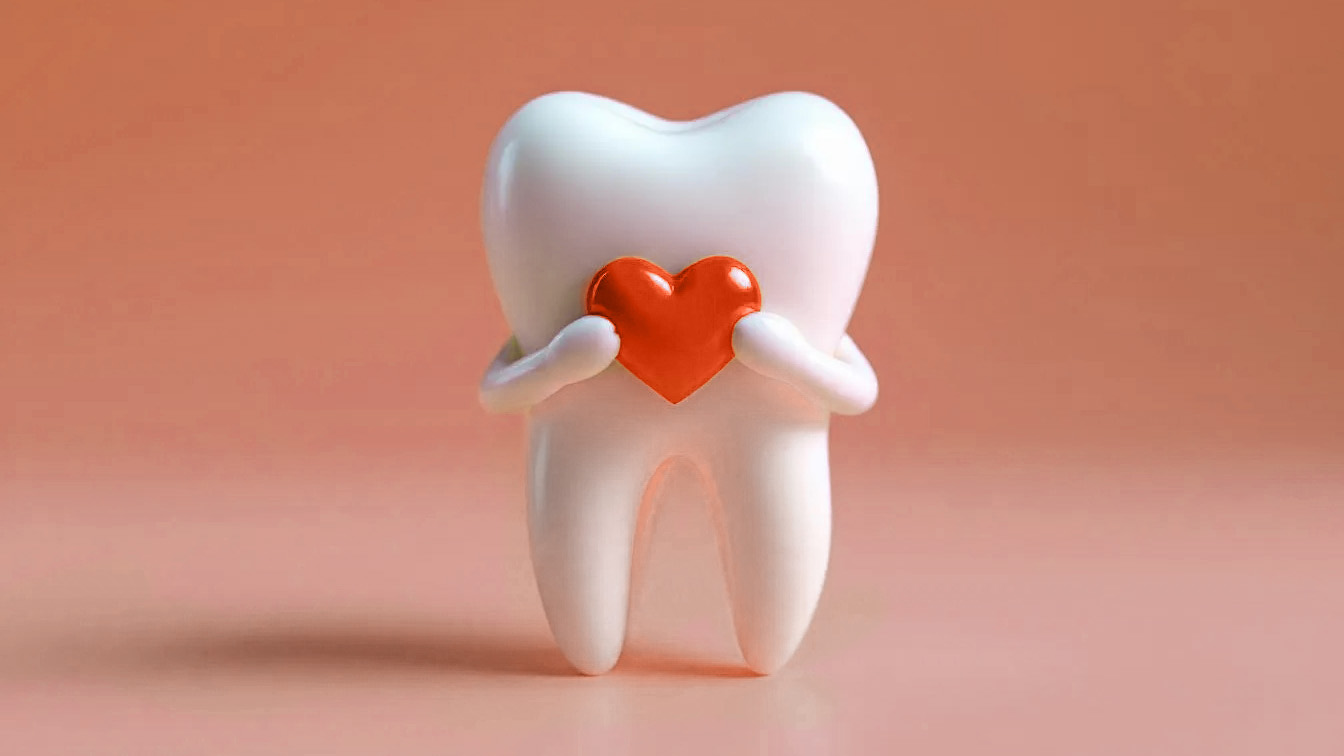Oral health and the heart: the inflammation that joins gums and arteries
You may have heard that the health of your mouth is linked to the health of your heart. It may sound surprising to think that gum problems could influence the risk of a heart attack or stroke, but the truth is that there is a real connection between oral health, in particular periodontitis, and cardiovascular disease. In this article, we’ll explore this relationship in a detailed and accessible way, explaining how chronic inflammation in the gums can be reflected in the arteries and the heart. We’ll talk directly to you, in clear and empathetic language – after all, looking after your smile can also be looking after your heart.
Understanding periodontitis
First of all, it’s important to understand what periodontitis is. Periodontitis is a chronic inflammatory disease that affects the supporting tissues of the teeth (gums, bone and periodontal ligaments). It usually starts with gingivitis (superficial inflammation of the gums caused by bacterial plaque). If left untreated, this infection can progress and gradually destroy the fibres and bones that hold the teeth together, leading to the teeth becoming loose and eventually lost. Periodontitis results from an imbalance: on the one hand, plaque accumulates at the gum line; on the other, our immune system’s response can be exaggerated or influenced by risk factors such as smoking, diabetes, genetic predisposition or stress. It’s a fairly common condition in adults and, because it’s a chronic inflammatory disease, it doesn’t just affect the mouth – it can have systemic repercussions.
Classic signs that something is wrong with your gums include redness, swelling, easy bleeding when brushing, receding gums (gums ‘shrinking’ exposing more of the tooth) and persistent bad breath. If you experience any of these symptoms, it’s important to seek a dental assessment. Early detection and treatment of gingivitis can prevent progression to periodontitis. But why should a gum infection also worry cardiologists? The short answer: inflammation.
Inflammation: the common link between gums and arteries
Inflammation is a natural process of the body’s defence against aggressors such as bacteria. In periodontitis, bacteria present in dental plaque infect the gums on an ongoing basis, triggering a chronic local inflammatory response. This inflammation is not restricted to the mouth: inflammatory substances released from the gums can enter the bloodstream and travel throughout the body. Over time, this state of low-grade systemic inflammation can contribute to damage to blood vessel walls.
Imagine inflammation as a ‘slow fire’ in the body. In the arteries, this fire favours the formation of atherosclerotic plaques – deposits of fat, cholesterol and other substances – which harden and narrow the vessels. Atherosclerosis is the main cause of myocardial infarction (heart attack), angina and stroke. In other words, chronic inflammation is a link between gum disease and artery disease. Studies indicate that periodontal disease increases the body’s inflammatory load, which can accelerate the atherosclerotic process in the coronary and cerebral arteries.
Another important link is bacteria from the mouth entering the bloodstream. In people with periodontitis, the inflamed gums become more permeable – simple activities such as chewing or brushing the teeth can allow plaque bacteria to enter the blood vessels. It has been shown that certain bacteria typical of periodontitis (for example, Porphyromonas gingivalis) can survive in the circulation and take up residence in distant places, including the walls of arteries. In fact, bacteria from the mouth have already been found inside atherosclerotic plaques in coronary and carotid arteries, suggesting a direct role in worsening these lesions. These microorganisms produce toxins (such as lipopolysaccharides) and activate the immune system, aggravating inflammation in the vessels. In simple terms: diseased gums can ‘seed’ inflammation and infectious agents throughout the body, potentially affecting the heart.
Evidence of the link between periodontitis and cardiovascular risk
The relationship between oral health and cardiovascular disease has been studied for several decades. People with active periodontal disease have, on average, a higher risk of suffering serious cardiovascular events compared to people with healthy gums. Several large-scale epidemiological studies have revealed this association. For example, a Swedish study of more than 1,600 adults (the PAROKRANK study) found a significantly higher prevalence of periodontitis in patients who had suffered myocardial infarction, compared to people with no history of infarction. After adjusting for other risk factors, the researchers concluded that individuals with periodontal disease were around 50 per cent more likely to have a heart attack than those without gum problems. In general terms, meta-analyses (studies that aggregate data from multiple studies) also confirm that there is a consistent association between periodontitis and an increased risk of coronary heart disease, strokes and other cardiovascular complications.
It’s important to emphasise that correlation is not the same as causation. In other words, although periodontitis and cardiovascular problems often occur in parallel, this doesn’t automatically mean that one directly causes the other. In fact, many people with heart disease have perfectly healthy gums, and vice versa – not all periodontitis patients will have heart problems. Part of the observed link is due to common risk factors: for example, smoking harms both the gums and the heart, poorly controlled diabetes contributes to periodontal infections and atherosclerosis, and an unhealthy diet affects both. So, someone who smokes and doesn’t take care of their oral hygiene can have both gingivitis and high cholesterol, but one thing isn’t necessarily directly caused by the other, but is rather the result of the same harmful lifestyle.
That said, scientists suspect that the association goes beyond these shared factors. Rigorous observational studies suggest that periodontitis may be an independent risk factor for cardiovascular disease. Even after excluding the effect of smoking, diet and other elements, an increased risk remains in individuals with chronic periodontal disease. In 2012, the American Heart Association (AHA) analysed all the available data and acknowledged that poor periodontal health is linked to a higher incidence of atherosclerosis, although it stressed that there is no high-level scientific evidence to prove a direct cause and effect relationship. In other words, so far we can’t say that ‘having periodontitis causes heart attacks’ with absolute certainty, nor can we say that treating periodontitis prevents heart attacks or strokes for sure. What is known is that there is a strong statistical and biological connection, and that in itself is important.
In practical terms, the medical and dental community considers this link to be worrying enough to warrant extra attention. It’s not a case of scaremongering – it doesn’t mean that a person with diseased gums is ‘doomed’ to have a heart problem. However, seeing oral health as an integral part of general health makes perfect sense. Some preliminary clinical work has shown, for example, that aggressively treating periodontitis can reduce systemic inflammatory markers (such as C-reactive protein) and improve artery function (making them more dilatable). This suggests that by controlling inflammation in the gums, we can also alleviate some of the inflammation in the blood vessels. However, more long-term studies are needed to determine whether treating periodontal disease actually translates into fewer heart attacks or strokes. For now, the consensus of experts is that good oral health is another ally in cardiovascular prevention, although it does not replace the measures we already know (such as cholesterol control, blood pressure, exercise, etc.).

How to take care of your oral health to protect your heart
After understanding the link between gums and arteries, the natural question is: what can I do in terms of oral health to benefit my heart as well? Fortunately, the recommendations don’t stray too far from the common sense you probably already know – the difference lies in seeing these habits not just as dental care, but as part of your general self-care. Here are some essential tips for maintaining healthy gums (and heart):
Strict daily oral hygiene: Brush your teeth at least twice a day for two minutes with a fluoride toothpaste. Use dental floss or interdental brushes daily to clean between the teeth where the toothbrush can’t reach. These simple habits remove plaque and prevent gingivitis before it develops.
Regular dental appointments: Visit your dentist or oral hygienist at least twice a year for a professional examination and cleaning. Even if you don’t feel pain, early periodontal disease can go unnoticed – regular check-ups detect problems early. Six-monthly cleanings (scaling) remove tartar and bacteria below the gums, reducing inflammation.
Don’t smoke and moderate alcohol: Tobacco is one of the main enemies of healthy gums (and your heart). Smoking favours periodontitis and at the same time contributes to atherosclerosis. If you’re a smoker, seeking support to quit will be one of the biggest favours you can do your gums and arteries. Excessive alcohol consumption can also affect oral and general health, so it should be moderated.
Control systemic factors: Diseases such as diabetes must be well controlled, as high glycaemia makes it more difficult for the gums to heal and increases the risk of infections, as well as being a cardiac risk factor. You should also maintain a cardioprotective lifestyle: a balanced diet rich in fruit and vegetables and low in sugars and saturated fats, as well as regular exercise. This will benefit both cardiovascular health and the body’s ability to fight periodontal inflammation.
Be aware of the signs and don’t put off treatment: Bleeding gums, swelling, pain or wobbling teeth should not be ignored. Seek dental care as soon as possible. Treating periodontitis (which can include deep scaling, root planing and sometimes antibiotics or periodontal surgery) can halt the progression of the disease and thus reduce the inflammatory load on your body. Think of it as an investment in your overall health.
In short, maintaining good oral health goes far beyond having a beautiful smile or avoiding dentures – it’s an important piece of the overall health puzzle. The gums and the heart may seem worlds apart, but they are connected by the bloodstream and the immune system. A healthy mouth helps keep inflammation in the body under control, alleviating a potential risk factor for the heart. So by devoting time and care to daily oral hygiene and regular visits to the dentist, you are also looking after your heart in an indirect but valuable way.
Remember: our body works as an integrated whole. A chronic infection in one part can have an effect on another – and the good news is that the reverse is also true. By improving the health of one aspect (such as treating diseased gums), we can reap benefits throughout the body. Cultivating these healthy habits and paying attention to your body’s signals is a gesture of love for yourself. Your smile and your heart will thank you.
References
Harvard Health Publishing – “Gum disease and heart disease: The common thread”. (15 Fev 2021)health.harvard.edu
American College of Cardiology (CardioSmart) – “Gum Disease Linked to Increased Risk for Heart Attack”. (27 Jan 2016)cardiosmart.orgcardiosmart.org
Niederman, R. & Weyant, R. – Evidence-Based Dentistry – “Periodontal Disease, Cardiovascular Disease, the American Heart Association, the American Academy of Periodontology, and the Rooster Syndrome”. (2012)nature.comnature.com
Mougeot, J.L.C. et al. – J. Oral Microbiol. 9(1):1281562 – “Porphyromonas gingivalis is the most abundant species detected in coronary and femoral arteries”. (2017)pmc.ncbi.nlm.nih.govpmc.ncbi.nlm.nih.gov
Seinost, G. et al. – Am. Heart J. 149(6):1050-4 – “Periodontal treatment improves endothelial dysfunction in patients with severe periodontitis”. (2005)pubmed.ncbi.nlm.nih.govpubmed.ncbi.nlm.nih.gov
Gouveia, A.R. – Lusíadas Saúde (Blog) – “Periodontite: maior risco de doença cardiovascular?”. (accessed 2023)lusiadas.ptlusiadas.pt



